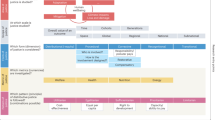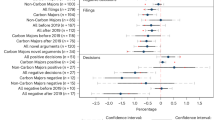Abstract
The transition towards low-carbon societies is creating winners and losers, raising new questions of justice. Around the world, litigation increasingly articulates these justice questions, challenging laws, projects and policies that aim to deliver climate change adaptation and/or mitigation. In this Perspective, we define and conceptualize the phenomenon of ‘just transition litigation’. This concept provides a new frame for identifying and understanding the diverse justice claims of those affected by climate action. We set out a research agenda to further investigate this phenomenon, with a view to enhancing societal acceptance and support for the transition.
This is a preview of subscription content, access via your institution
Access options
Access Nature and 54 other Nature Portfolio journals
Get Nature+, our best-value online-access subscription
$32.99 / 30 days
cancel any time
Subscribe to this journal
Receive 12 digital issues and online access to articles
$119.00 per year
only $9.92 per issue
Buy this article
- Purchase on SpringerLink
- Instant access to the full article PDF.
USD 39.95
Prices may be subject to local taxes which are calculated during checkout




Similar content being viewed by others
References
Statnett SF et al. v. Sør-Fosen sijte et al. Supreme Court of Norway No. HR-2021-1975-S (11 October 2021).
Savaresi, A. & Setzer, J. Rights-based litigation in the climate emergency: mapping the landscape and new knowledge frontiers. J. Hum. Rights Environ. 13, 7–34 (2022).
Olsen, B. Wind energy and local acceptance: how to get beyond the NIMBY effect. Eur. Environ. Law Rev. 19, 239–251 (2010).
Peeters, M. & Nóbrega, S. Climate change-related Aarhus conflicts: how successful are procedural rights in EU climate law? Rev. Eur. Comp. Int. Environ. Law 23, 354–364 (2014).
Armeni, C. Participation in environmental decision-making: reflecting on planning and community benefits for major wind farms. J. Environ. Law 28, 415–441 (2016).
Schapper, A., Unrau, C. & Killoh, S. Social mobilization against large hydroelectric dams: a comparison of Ethiopia, Brazil, and Panama. J. Sustain. Dev. 28, 413–423 (2020).
Schapper, A., Scheper, C. & Unrau, C. The material politics of damming water: an introduction. J. Sustain. Dev. 28, 393–395 (2020).
McHarg, A. in Energy Justice and Energy Law (eds del Guayo, Í. et al.) 3–12 (Oxford Univ. Press, 2020).
Van Uffelen, N., Taebi, B. & Pesch, U. Revisiting the energy justice framework: doing justice to normative uncertainties. Renew. Sustain. Energy Rev. 189, Part A 113974 (2024).
Setzer, J. & Higham, C. Global Trends in Climate Change Litigation: 2021 Snapshot (Grantham Research Institute on Climate Change and the Environment & London School of Economics and Political Science, 2021).
Burger, M. & Tigre, M. A. Global Climate Change Litigation Report: 2023 Status Review (Sabin Center for Climate Change Law, Columbia Law School & United Nations Environment Programme, 2023).
Stevis, D. & Felli, R. Global labour unions and just transition to a green economy. Int. Environ. Agreem. 15, 29–43 (2015).
Segall, C. H. Just transitions for oil and gas communities. VA Environ. Law J. 39, 177–232 (2021).
Ghaleigh, N. S. In The Constitution of Social Democracy: Essays in Honour of Keith Ewing (eds Bogg, A. et al.) 429–452 (Bloomsbury Academic, Hart, 2019).
Guidelines for a Just Transition Towards Environmentally Sustainable Economies and Societies for All (ILO, 2015).
Paris Agreement 3156 UNTS 54113 (adopted 12 December 2015, entered into force 4 November 2016).
Abram, S. et al. Just transition: a whole-systems approach to decarbonisation. Clim. Policy 22, 1033–1049 (2022).
Harrington, A. R. Just Transitions and the Future of Law and Regulation (Palgrave Macmillan, 2022).
Sovacool, B. K. et al. Decarbonization and its discontents: a critical energy justice article on four low-carbon transitions. Climatic Change 155, 581–619 (2019).
Wang, X. & Lo, K. Just transition: a conceptual review. Energy Res. Soc. Sci. 82, 102291 (2021).
The European Green Deal (European Commission, 2019).
Work Programme on Just Transition Pathways Referred to in the Relevant Paragraphs of Decision 1/CMA.4 (UNFCCC, 2022).
Müllerová, H., Balounová, E., Ruppel, O. C. & Houston, L. J. Building the concept of just transition in law: reflections on its conceptual framing, structure and content. Environ. Policy Law 53, 275–288 (2023).
Johansson, V. Just transition as an evolving concept in international climate law. J. Environ. Law 35, 229–249 (2023).
Setzer, J. & Vanhala, L. C. Climate change litigation: a review of research on courts and litigants in climate governance. WIREs. Clim. Change 10, e580 (2019).
Peel, J. & Osofsky, H. M. Climate change litigation. Annu. Rev. Law Soc. Sci. 16, 21–38 (2020).
Bouwer, K. The unsexy future of climate change litigation. J. Environ. Law 30, 483–506 (2018).
Neubauer et al. v. Germany German Federal Constitutional Court Nos. 1 BvR 2656/18, 1 BvR 78/20, 1 BvR 96/20, 1 BvR 288/20 (24 March 2021).
Urgenda Foundation v. State of the Netherlands Dutch Supreme Court No. ECLI:NL:HR: 2019:2007 (20 December 2019).
Peel, J. & Osofsky, H. M. Climate Change Litigation: Regulatory Pathways to Cleaner Energy 28–53 (Cambridge Univ. Press, 2015).
Hilson, C. J. in Climate Change: La Riposta del Diritto (eds Fracchia, F. & Occhiena, M.) 421–436 (Editoriale Scientifica, 2010).
Regulation (EU) 2023/435 of the European Parliament and of the Council of 27 February 2023 Amending Regulation (EU) 2021/241 as Regards REPowerEU Chapters in Recovery and Resilience Plans and Amending Regulations (EU) No 1303/2013, (EU) 2021/1060 and (EU) 2021/1755, and Directive 2003/87/EC (European Union, 2023).
Regulation (EU) 2024/1252 of the European Parliament and of the Council of 11 April 2024 Establishing a Framework for Ensuring a Secure and Sustainable Supply of Critical Raw Materials and Amending Regulations (EU) No 168/2013, (EU) 2018/858, (EU) 2018/1724 and (EU) 2019/1020 (European Union, 2024).
Armeni, C. What justice? The scope for public participation in the European Union just transition. Common Mark. Law Rev. 60, 1027–1054 (2023).
Tackling the Climate Crisis at Home and Abroad Executive Order 14008 86 FR 7619 (Executive Office of the President, 2021).
Shaw, A. & Willard, L. J. House Republicans Advance Legislation Providing Their Vision of Energy and Permitting Reform (Dentons, 2023).
Fraser, N. Scales of Justice: Reimagining Political Space in a Globalizing World (Columbia Univ. Press, 2010).
Schlosberg, D. Defining Environmental Justice: Theories, Movements, and Nature (Oxford Univ. Press, 2009).
Sovacool, B. Energy and Ethics: Justice and the Global Energy Challenge (Palgrave Macmillan, 2013).
Gupta, J. et al. Earth system justice needed to identify and live within earth system boundaries. Nat. Sustain. 6, 630–638 (2023).
Tigre, M. A. et al. Just Transition Litigation in Latin America: An Initial Categorization of Climate Change Litigation Cases Amid the Energy Transition (Sabin Center for Climate Change Law, Columbia Law School & United Nations Environment Programme, 2023).
Uren v. Bald Hills Wind Farm Pty Ltd [2022] Victoria Supreme Court 145 (25 March 2022).
Consórcio Norte Energia (re Belo Monte dam in Brazil) Inter-American Commission on Human Rights (filed 7 January 2016).
Company Workers Union of Maritima & Commercial Somarco Limited and Others v. Ministry of Energy Chilean Supreme Court No. 25 530-2021 (9 August 2021).
Pirá Paraná Indigenous Council and Association of Indigenous Traditional Authorities of river Pirá Paraná ‘ACAIPI’ v. Ministry of Environment and Sustainable Development and others (filed 15 July 2022).
ProDESC and ECCHR v. EDF Paris Civil Court (30 November 2021).
FOCSIV and Others v. FCA Italy (Stellantis NV) Dutch National Contact Point (filed 21 July 2022).
OECD Guidelines for Multinational Enterprises on Responsible Business Conduct (OECD, 2023).
Duffy, H. Strategic Human Rights Litigation: Understanding and Maximising Impact (Bloomsbury, 2018).
Vanhala, L. C. Process tracing in the study of environmental politics. Glob. Environ. Polit. 17, 88–105 (2017).
Beach, D. & Pedersen, R. B. Process-Tracing Methods: Foundations and Guidelines 2nd edn (Univ. Michigan Press, 2019).
Acknowledgements
A.S. gratefully acknowledges the support received from the British Academy to organize the ‘Just Transition Litigation: A New Knowledge Frontier’ workshop held at the Edinburgh Climate Change Institute on 17 October 2022.
Author information
Authors and Affiliations
Contributions
A.S. and J.S. conceived and designed the Perspective. A.S. coordinated the writing process, all authors wrote the text and A.S., J.S., S.B., K.B., T.C. and I.K. edited the text.
Corresponding author
Ethics declarations
Competing interests
The authors declare no competing interests.
Peer review
Peer review information
Nature Sustainability thanks Alix Dietzel and Jacqueline Peel for their contribution to the peer review of this work.
Additional information
Publisher’s note Springer Nature remains neutral with regard to jurisdictional claims in published maps and institutional affiliations.
Rights and permissions
Springer Nature or its licensor (e.g. a society or other partner) holds exclusive rights to this article under a publishing agreement with the author(s) or other rightsholder(s); author self-archiving of the accepted manuscript version of this article is solely governed by the terms of such publishing agreement and applicable law.
About this article
Cite this article
Savaresi, A., Setzer, J., Bookman, S. et al. Conceptualizing just transition litigation. Nat Sustain 7, 1379–1384 (2024). https://doi.org/10.1038/s41893-024-01439-y
Received:
Accepted:
Published:
Version of record:
Issue date:
DOI: https://doi.org/10.1038/s41893-024-01439-y



